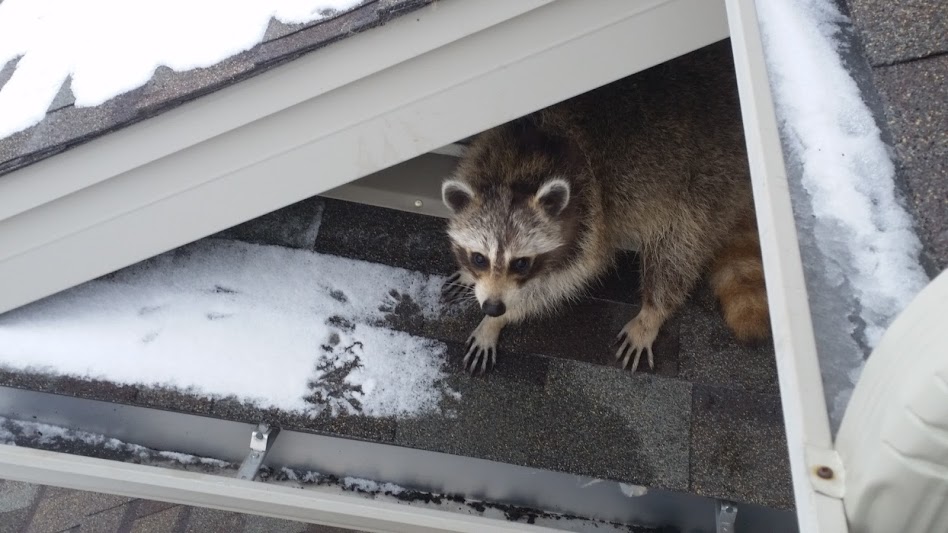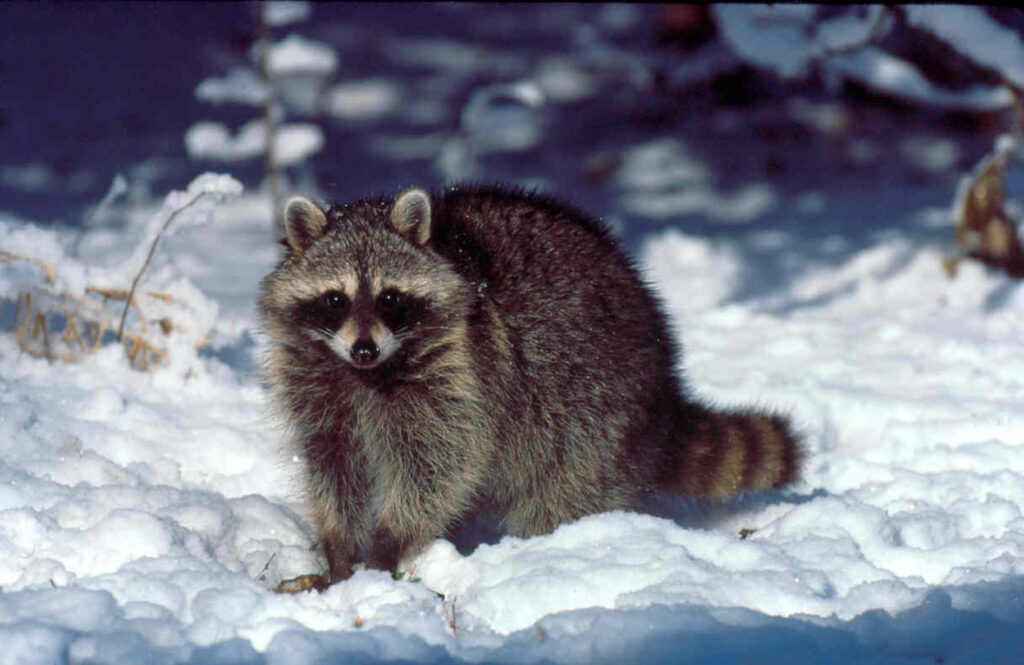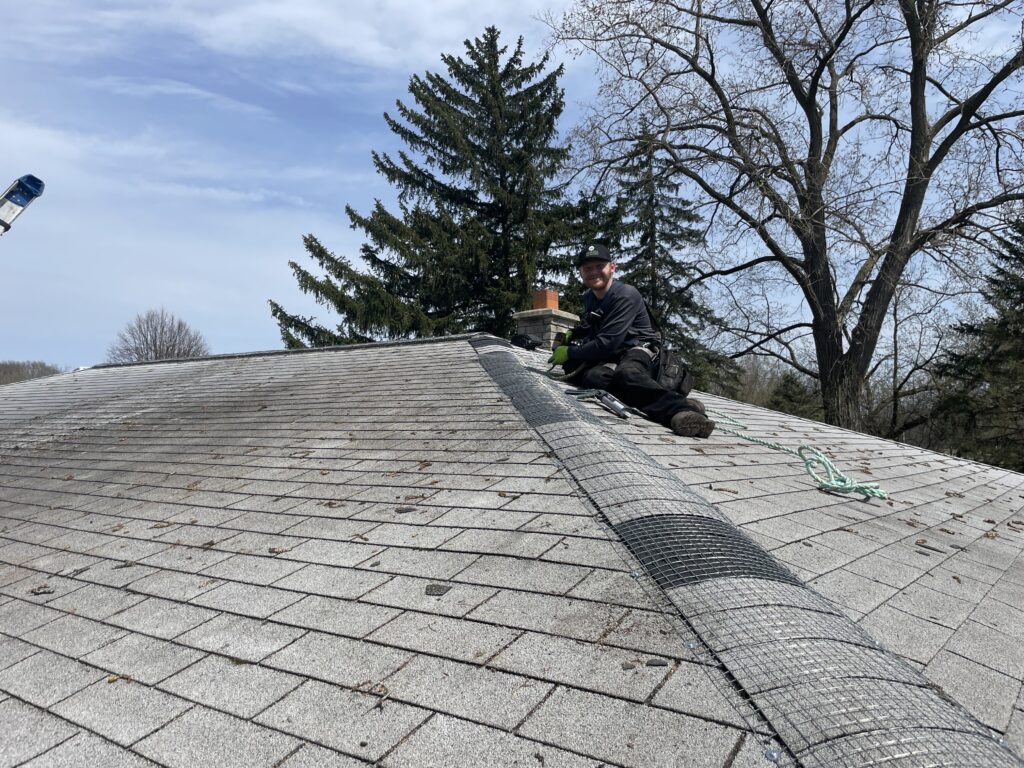With a little bit of knowledge and preparation, you can safely and humanely evict these furry bandits from your property. In this blog post, you’ll learn how to get rid of raccoons by understanding their behaviour, habitat preferences. We’ll also cover the importance of preventative measures to ensure that you won’t have to deal with raccoons invading your space in the future. So let’s dive in and explore the Whitby wildlife control winter survival guide for raccoons!
As the temperatures drop and the winter season approaches, it’s not just humans who have to prepare for the cold weather. Raccoons, notorious for their resilience and adaptability, must also brace themselves for the harsh conditions ahead. However, as well-adapted as they may be, raccoons can still become problematic for homeowners in the Whitby area.
Whether it’s sneaking into attics to build nests or raiding garbage cans, raccoons can quickly become a nuisance. That’s why Whitby wildlife control experts recommend taking proactive measures to ensure raccoons don’t become a disruption. In this winter survival guide, we’ll discuss the best practices for raccoon removal in Whitby, as well as effective and humane ways to get rid of raccoons if they do make their way onto your property. With these tips, homeowners can rest easy knowing they won’t have to deal with unexpected, unwanted visitors this winter season.
Understanding Raccoon Behaviour during Winter
During winter, raccoons go through a period known as “torpor”. Unlike true hibernation where animals are in a deep sleep and don’t eat at all, during torpor, raccoons sleep heavily, yet they are still able to wake up to eat if food is available. The body temperature and metabolic rates drop, allowing the raccoon to conserve energy. They usually sleep nestled in their dens for weeks until the weather improves or hunger stirs them.
It’s within this period that raccoons can often become problematic for homeowners. Searching for warm and safe places to bunk down and ride out the winter, raccoons can cause havoc as they make their homes in places like your garages, chimneys or attics. They can even go as far as tearing up insulation, ductwork, and other parts of the home in their quest for the perfect nesting spot.
How to Identify Raccoon Infestation in Your Property
Spotting signs of a raccoon infestation early can save you a lot of trouble, not to mention potential damage to your home. They can be quite mischievous and sneaky, but there are certain tell-tale signs that indicate you might be dealing with a raccoon problem.
Physical Evidence of Raccoon Activity
Raccoons are nocturnal, so you might not often see them directly. However, these animals leave traces that indicate their presence. Here are some signs you should look out for:
- Trash cans tipped over: Raccoons are known for their love of scavenging in trash bins. If you notice your trash cans often being tipped over or tampered with, it’s a strong sign of raccoon activity.
- Droppings: Raccoon feces can be problematic as they carry diseases. They are similar in appearance to dog feces but often have a strong odor and contain undigested food particles.
- Tracks: Raccoon footprints are unique. If you see footprints with five toes each and about the size of a human toddler’s hand in your yard, it’s very likely you have raccoons.
Indicative Sounds and Destructive Activities
Aside from physical evidence, raccoons make certain sounds and engage in damaging activities that can indicate their presence. Here are some things you should look out for:
- Noises: Raccoons are fairly noisy. They hiss, purr, growl, and scream. If you’re hearing these types of sounds, particularly at night, you might have a raccoon problem.
- Damage: Structural damages, especially to roof vents, shingles, and soffits, can indicate a raccoon’s desire to access your attic.
- Nesting materials: Bits of torn-up insulation, paper, leaves, and other materials found scattered around might be from a raccoon making itself a den.
Identifying a raccoon infestation at an early stage is imperative. If you find any of these signs, do not try to remove the raccoons yourself. Raccoons can be aggressive when threatened, and they carry many diseases which can be transmitted to humans. Instead, call a wildlife control professional in Whitby who can handle the situation in a safe and humane manner.

Preventing Raccoons from Entering Attics and Garages
Preventing raccoons from gaining access to your home is crucial to averting potential damage and infestations during winter. By implementing the steps listed below, you can efficiently make your home less appealing to these resourceful animals.
Securing Your Trash Bins
Raccoons are attracted to places with easy food sources. A common lure for raccoons is an unsecured garbage can. To deter raccoons from rifling through your trash, consider using metal trash cans with lid locks. Another option is storing your trash cans in your garage or shed until collection day, ensuring that the pungent smell does not entice any unwanted visitors.
Eliminating Food Sources
Raccoons are omnivores and will consume practically anything. This includes pet food, birdseed, fruits from backyard trees, and vegetable gardens. To discourage raccoons from frequenting your property, ensure pet food is not left outside overnight, remove bird feeders, and pick up fallen fruit from trees in your garden regularly.
Sealing Entry Points
Raccoons are capable climbers and can easily scale your walls to reach the attic or upper levels of your home. Check for potential entry points, such as loose soffits, broken vents, and gaps in the roofing. Repair these and seal any crevices, no matter how small, to prevent raccoons from taking up residence in your home.
Keeping Your Landscape Clean
A clean and well-maintained yard is less appealing to raccoons. Avoid leaving brush piles, wood stacks, or other debris that could provide a hiding place for raccoons. Keeping your grass and plants well-cut reduces shelter options and makes your property less appealing for raccoons seeking a winter home.

Raccoon Control Methods for Winter
There are several methods you can employ to control raccoon activity during winter. Remember, it’s better to apply these measures before the cold weather hits to prevent raccoons from settling in your property in the first place.
Use Natural Repellents
One solution is the use of natural repellents like ammonia or vinegar, which raccoons find irritating. Soak rags in ammonia or vinegar and place them near areas where you suspect raccoons are frequenting. Please note, that while these options might be a good temporary solution, their effectiveness can diminish over time or with severe weather.
Install Motion-Activated Lights and Sprinklers
Raccoons often prefer to work in the dark and are usually deterred by sudden, unexpected movements and bright lights. Motion-activated flood lights are a useful investment that can serve to scare off raccoons. Similarly, motion-detected sprinkler systems can send a sudden burst of water when triggered and keep these sneaky wildlife at bay.
Install Secure Fencing
Proper fencing can deter raccoons from entering your property. Ensure that the fence is high enough (about 5 – 6 ft.) and buried at least a foot deep to prevent raccoons from climbing over or digging under it. Additionally, a four-foot overhang can stop them from climbing over the fence.
Consider Noise and Ultrasonic Devices
Though you wouldn’t want to disturb your neighbours, noise devices, particularly those within the raccoon’s hearing range, can be effective deterrents. Ultrasonic devices can frighten raccoons and persuade them to stay away from your property. However, raccoons may eventually become accustomed to these sounds, so this should be used in conjunction with other methods.

When to Call Wildlife Control Services for Humane Raccoon Removal in Whitby
Recognizing the right time to call for professional wildlife control services can be crucial in effectively managing raccoon infestations in winter. Let’s explore certain situations where professional intervention will be most beneficial.
Repeated or Persistent Signs of Infestation
If your efforts to keep raccoons out haven’t been successful and there are persistent signs of infestation, it means it’s time to call the professionals. Don’t underestimate the effects of a small and seemingly manageable raccoon infestation. If left unattended, you’re allowing these critters to nest and reproduce, making the removal process more complicated in the future.
Aggressive Behaviours
While raccoons are generally shy, they can become unpredictable and aggressive when they feel cornered or threatened. If you notice any sign of aggressive behaviour, particularly from a mother protecting her cubs, immediately call for professional help. Dealing with an aggressive raccoon requires expert knowledge and equipment to ensure your safety and the humane handling of them.
Presence of Sick Raccoons
Raccoons are known carriers of various diseases including rabies, distemper, and parasites such as ticks and fleas. If you spot a raccoon that looks visibly sick or behaves erratically, contact local wildlife control immediately. Do not attempt to engage or capture it on your own as you risk exposing yourself and your pets to these ailments.
Inability to Identify or Seal Off Entry Points
In situations where you’re unable to locate or effectively seal off the raccoon’s entry and exit points, professional help should be sought. They have the training and equipment to thoroughly inspect your home, identify weak spots, and deal with them so that raccoons do not return.
To conclude, dealing with a raccoon infestation during winter is a complex process that requires knowledge, diligence, and sometimes professional help. Whenever you’re in doubt, it’s always best to contact Skedaddle for professional wildlife control services in Whitby for effective, humane raccoon removal and prevention.


